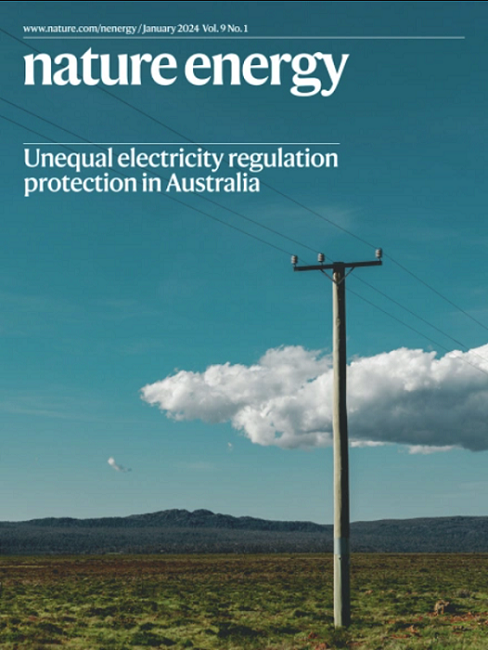热泵带来的舒适反弹以及对家庭制冷行为和能源安全的影响
IF 60.1
1区 材料科学
Q1 ENERGY & FUELS
引用次数: 0
摘要
采用清洁能源技术为家庭提供了克服能源不安全的可行解决方案。热泵通过减少能源费用和增加能源服务来促进这一潜力。我们研究了采用热泵在缓解能源不安全方面的作用,利用来自亚利桑那州凤凰城8,656户家庭的电力记录。我们使用热舒适指数来检查使用温度-电力响应函数的家庭的能源限制行为。我们的回归结果表明,有热泵的家庭比没有热泵的家庭在0.996°C的温度下开始制冷,并且每天每温度升高一度消耗0.476千瓦时的电力。研究表明,热泵通过提前启动夏季制冷系统来提高室内舒适度。操作成本的节约带来了更大的舒适度。此外,这种采用减少了不同收入群体之间的能源公平差距,从而产生更相似和舒适的冷却启动温度。这项研究支持采用清洁技术来减少能源不安全。拥有热泵的美国家庭开始制冷的时间更早,这种采用缩小了基于收入的制冷差距。热泵有助于缓解能源不安全,使能源更实惠,使家庭更舒适。本文章由计算机程序翻译,如有差异,请以英文原文为准。

The comfort rebound from heat pumps and impact on household cooling behaviour and energy security
Adopting clean energy technologies offers households a viable solution to overcome energy insecurity. Heat pumps contribute to this potential by reducing energy expenses and increasing energy services. We examine the role of adopting heat pumps in mitigating energy insecurity, utilizing electricity records from 8,656 households in Phoenix, Arizona. We use a thermal comfort index to examine a household’s energy-limiting behaviour using a temperature–electricity response function. Our regression results show that households with heat pumps initiate cooling at 0.996 °C lower than those without and consume 0.476 kWh less electricity daily per degree increase in temperature. It indicates that heat pumps improve indoor comfort by activating earlier summer cooling. Cost savings from operation have a rebound effect of enabling greater comfort. Furthermore, this adoption reduces the energy equity gap across income groups, resulting in more similar and comfortable cooling start temperatures. This study supports the adoption of clean technologies to reduce energy insecurity. US households with heat pumps begin cooling earlier, and this adoption narrows the income-based disparities in cooling. Heat pumps help alleviate energy insecurity, make energy more affordable and make homes more comfortable.
求助全文
通过发布文献求助,成功后即可免费获取论文全文。
去求助
来源期刊

Nature Energy
Energy-Energy Engineering and Power Technology
CiteScore
75.10
自引率
1.10%
发文量
193
期刊介绍:
Nature Energy is a monthly, online-only journal committed to showcasing the most impactful research on energy, covering everything from its generation and distribution to the societal implications of energy technologies and policies.
With a focus on exploring all facets of the ongoing energy discourse, Nature Energy delves into topics such as energy generation, storage, distribution, management, and the societal impacts of energy technologies and policies. Emphasizing studies that push the boundaries of knowledge and contribute to the development of next-generation solutions, the journal serves as a platform for the exchange of ideas among stakeholders at the forefront of the energy sector.
Maintaining the hallmark standards of the Nature brand, Nature Energy boasts a dedicated team of professional editors, a rigorous peer-review process, meticulous copy-editing and production, rapid publication times, and editorial independence.
In addition to original research articles, Nature Energy also publishes a range of content types, including Comments, Perspectives, Reviews, News & Views, Features, and Correspondence, covering a diverse array of disciplines relevant to the field of energy.
 求助内容:
求助内容: 应助结果提醒方式:
应助结果提醒方式:


